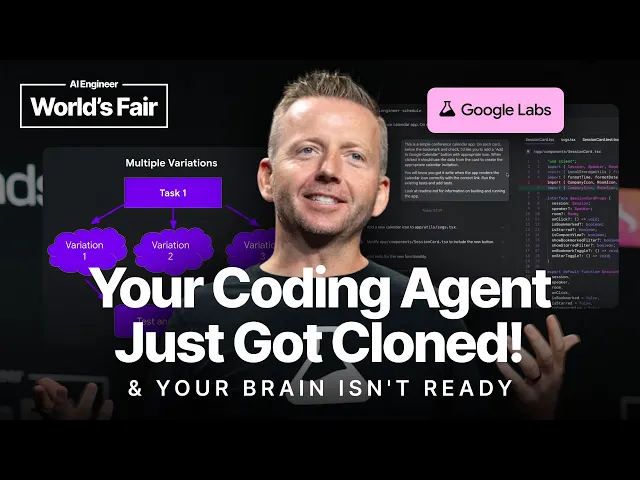Your Coding Agent Just Got Cloned And Your Brain Isn’t Ready – Rustin Banks, Google Jules

AI coding agents shape the future of work
In a provocative presentation at a recent tech conference, Rustin Banks from Google's Jules project delivered a thought-provoking look at how AI coding agents are fundamentally reshaping the development landscape. Banks outlined a compelling vision where personal AI agents don't just assist with coding tasks but become deeply integrated development partners who understand our code, preferences, and even our thinking patterns. This technological leap represents not just an evolution in tools, but potentially a revolution in how we approach software creation itself.
Key Points
-
AI coding agents are evolving from simple assistants to personalized collaborators that learn your coding style, preferences, and problem-solving approaches, effectively becoming "clones" of your development patterns.
-
The concept of "agency" in AI is transforming how we interact with these tools—they're shifting from passive responders to proactive agents that can initiate actions, make decisions, and solve complex problems autonomously.
-
Modern development increasingly requires navigating vast repositories and complex dependencies, making the need for AI agents that can understand and navigate this complexity more critical than ever.
-
The most effective AI coding agents serve as intermediaries that translate between human intentions and computer implementation, bridging the semantic gap that has historically made programming challenging.
When Your AI Agent Becomes Your Digital Twin
The most compelling insight from Banks' presentation is the concept of AI agents evolving into personalized digital twins of developers. This isn't just about tools that follow commands—it's about collaborative partners that internalize your preferences, anticipate your needs, and even replicate your problem-solving approach.
This matters profoundly in the context of today's development landscape. As systems grow more complex and interdependent, the cognitive load on developers has increased exponentially. Traditional coding assistants help but still require explicit direction. An agent that genuinely understands how you think can dramatically reduce this cognitive burden, allowing developers to focus on higher-level problem-solving while the agent handles implementation details in a way aligned with your personal approach.
Beyond the Demo: The Real-World Impact
While Banks presents a compelling vision, what might this look like in practical implementation? Consider an enterprise development team working on a legacy system with millions of lines of code. Today, onboarding new developers to such systems takes months as they struggle to understand the codebase's structure, conventions,
Recent Videos
How To Earn MONEY With Images (No Bullsh*t)
Smart earnings from your image collection In today's digital economy, passive income streams have become increasingly accessible to creators with various skill sets. A recent YouTube video cuts through the hype to explore legitimate ways photographers, designers, and even casual smartphone users can monetize their image collections. The strategies outlined don't rely on unrealistic promises or complicated schemes—instead, they focus on established marketplaces with proven revenue potential for image creators. Key Points Stock photography platforms like Shutterstock, Adobe Stock, and Getty Images remain viable income sources when you understand their specific requirements and optimize your submissions accordingly. Specialized marketplaces focusing...
Oct 3, 2025New SHAPE SHIFTING AI Robot Is Freaking People Out
Liquid robots will change everything In the quiet labs of Carnegie Mellon University, scientists have created something that feels plucked from science fiction—a magnetic slime robot that can transform between liquid and solid states, slipping through tight spaces before reassembling on the other side. This technology, showcased in a recent YouTube video, represents a significant leap beyond traditional robotics into a realm where machines mimic not just animal movements, but their fundamental physical properties. While the internet might be buzzing with dystopian concerns about "shape-shifting terminators," the reality offers far more promising applications that could revolutionize medicine, rescue operations, and...
Oct 3, 2025How To Do Homeless AI Tiktok Trend (Tiktok Homeless AI Tutorial)
AI homeless trend raises ethical concerns In an era where social media trends evolve faster than we can comprehend them, TikTok's "homeless AI" trend has sparked both creative engagement and serious ethical questions. The trend, which involves using AI to transform ordinary photos into images depicting homelessness, has rapidly gained traction across the platform, with creators eagerly jumping on board to showcase their digital transformations. While the technical process is relatively straightforward, the implications of digitally "becoming homeless" for entertainment deserve careful consideration. The video tutorial provides a step-by-step guide on creating these AI-generated images, explaining how users can transform...
